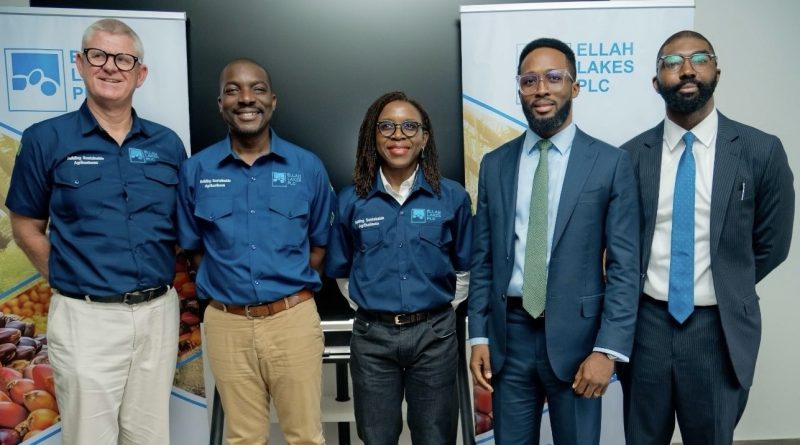Ellah Lakes banks on Nigeria’s oil palm boom with N235 billion public offer
(L-R): Paul Farrer, Deputy Managing Director, Ellah Lakes; Chuka Mordi, Chief Executive Officer, Ellah Lakes; Osaro Oyegun, Director, Ellah Lakes; Seun Onayiga, Co-Founder & Managing Director, ACQ Capital Managers; and Bimbo Oyeyiga, Head Corporate Finance, Rand Merchant Bank; at its press conference in Lagos announcing its intention to undertake a public offer.
Ellah Lakes Plc is placing a bold bet on Nigeria’s oil palm industry with the launch of its N235 billion public offer. This is a move, the company says will fund its transformation into one of Nigeria’s top five palm oil producers.
The agro-allied company is projecting a profit of N113.9 billion from its newly acquired Agro-Resources and Processing Nigeria Limited (ARPN) asset by 2030, alongside an estimated revenue of N167 billion. By 2026, following full integration of ARPN, Ellah Lakes expects to generate around N24 billion from that outfit, an outcome that will bring significant relief to its promoters.
Speaking during the company’s Fact Behind the Offer presentation at the Nigerian Exchange (NGX), Managing Director Chuka Mordi spoke about the long-term value the raise would propel. According to him, post-acquisition, Ellah Lakes “will have a total land bank of 34,000 hectares,” and in the next five years, they “expect to be going towards 200 billion Naira in terms of revenue”
The offer, which opened on November 10, will see Ellah Lakes issue 18.8 billion new shares to the public at N12.50 per share. Proceeds are earmarked primarily for the ARPN acquisition from the Tolaram Group and for the construction of a crude palm oil processing mill on ARPN’s site in Edo State.
Read Also: Ellah Lakes breaks silence on years of investment with revenue now in sight – Businessday NG
ARPN itself represents a valuable addition to Ellah Lakes’ portfolio. The company holds a land bank of 22,176 hectares, with about 10,000 hectares already cultivated and 6,280 hectares hosting mature oil palm plantations. The planned processing mill will enable Ellah Lakes to immediately monetise the existing mature fruit bunches, which Mordi described as a “pathway to early cash flow accretion” beginning in 2026.
Beyond corporate expansion, Ellah Lakes is also betting on the strength of Nigeria’s palm oil revival. The sector, which for decades struggled under weak productivity and import dependence, is now witnessing renewed investor attention and stronger price performance. In 2024, the industry grew by 103 percent, far outpacing Nigeria’s GDP growth rate of 3.4 percent.
Mordi noted that the upward trend reflects broader investor confidence in agribusiness and the underlying economics of the palm oil value chain. To illustrate this, he cited Presco Plc, one of Nigeria’s largest listed palm oil producers, whose share price surged from around N40 to N1,400 in just five years.
He noted, “It’s an indication of the nature of quality businesses that are coming into the sector on the Nigerian Stock Exchange and the amount of value that we think is possible to deliver to shareholders.”
For Ellah Lakes, the next few years will test how well strategy, capital, and execution can converge to capture the value in Nigeria’s agricultural value chain.

